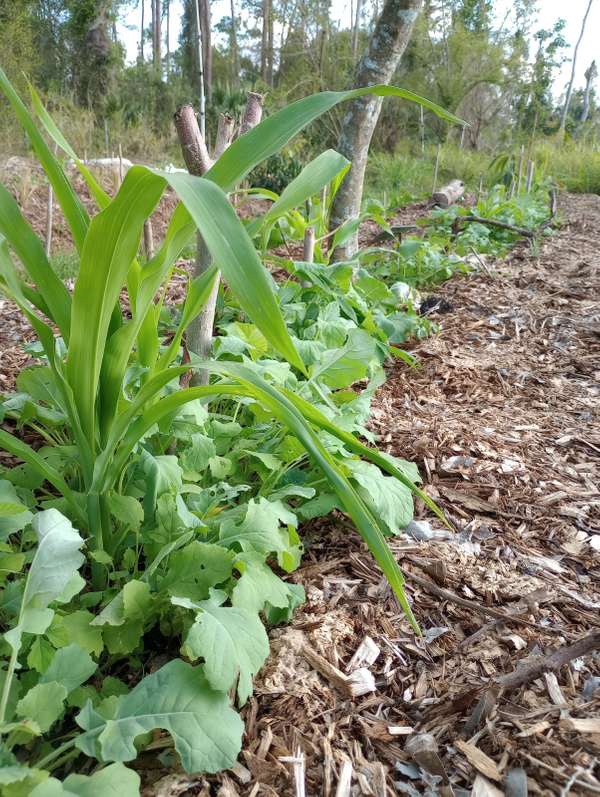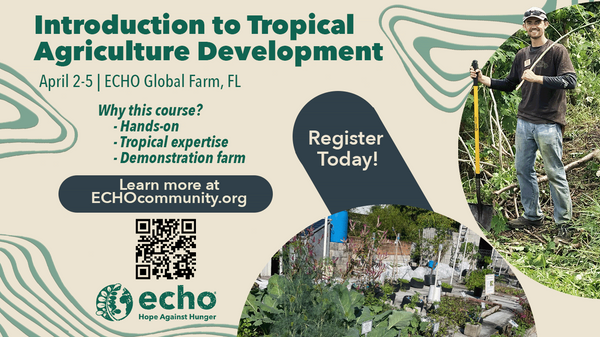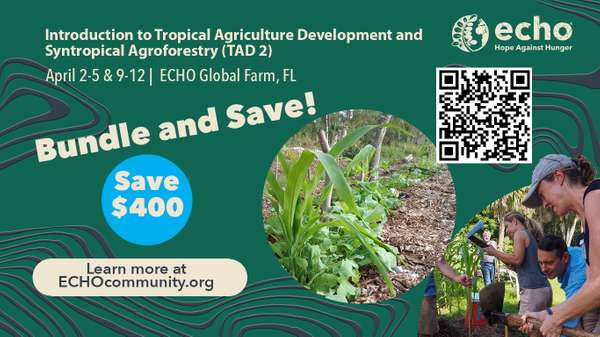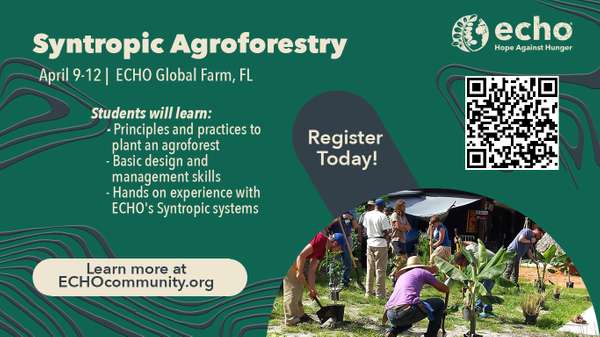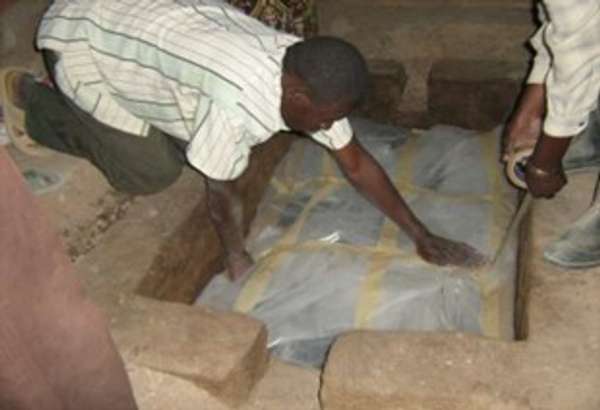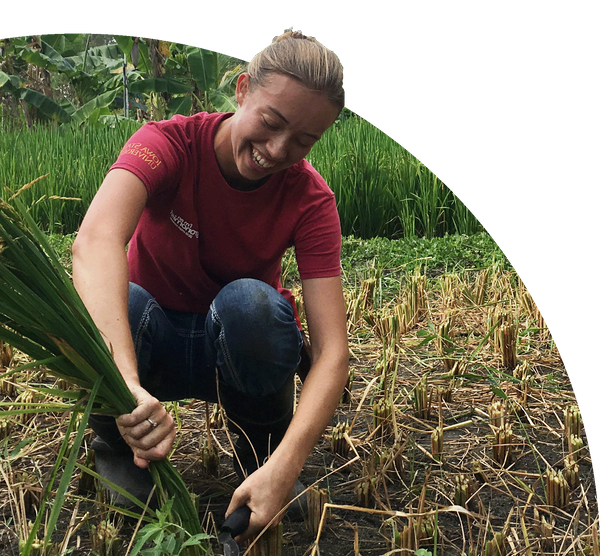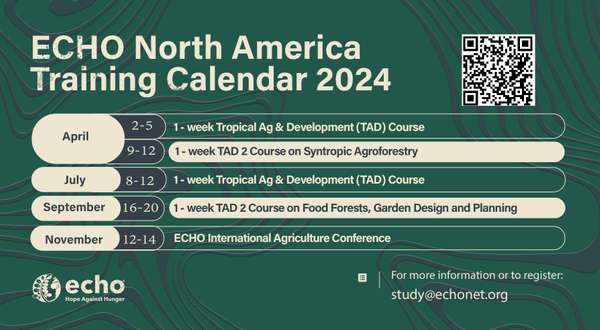ECHOcommunity Actualizaciones
EDN Número 163 Disponible Ahora 2024-04-01
Temas de Relieve:
- Consideraciones sobre cosecha y secado para obtener polvo de hojas de moringa de calidad
- Ecos de nuestra red: Opciones para el control de caracoles
- Del Banco de Semillas de ECHO: Yute malva ‘Tailandés‘
- Libros, Sitios Web y Otros Recursos: Aplicación móvil ECHOcommunity Mobile App
Consideraciones sobre cosecha y secado para obtener polvo de hojas de moringa de calidad
Tim Motis
Extracto:
Los minerales y las proteínas variaron poco entre métodos. Con respecto a las vitaminas, las mayores pérdidas en comparación con el secado en sombra fueron las de vitamina A con secado al sol (9% de pérdida) y vitamina C con secado al horno (60% de pérdida). Aún con una pérdida del 60% de vitamina C con secado al horno, una porción de 5 g de la cantidad restante proporcionaría el 19% de la ingesta diaria recomendada de 15 g para un niño de 1 a 3 años de edad.
Bundle and Save! Tropical Agriculture Development Courses discounted when you register for both! 2024-03-26
We are excited to announce that ECHO North America will be hosting a Tropical Agriculture Development Course 2 in April titled Syntropic Agroforestry. This course will cover the principles and practices needed for a beginner to plant their own agroforest. Basic design and management skills will also be taught. An attendee can expect to return home with enough knowledge to produce a couple of rows of trees, so they start learning more through firsthand experience. The Bundle is TAD 1 and 2 together in April!
Two-course cost: $1300 (savings up to $400!)
Syntropic Agroforestry Bundle and Save!
Until slots are full, ECHO is offering a special discounted rate for those who register for both courses at the same time! That's two information-packed weeks on the ECHO farm learning from experienced ECHO staff and Partners and interacting with a multitude of tropical crops, systems, and animals.
Annual Sugar Cane Harvest at ECHO North America Regional Impact Center 2024-03-19
Several weeks ago, we held our annual sugarcane harvest at the North America Regional Impact Center. Many staff and volunteers contributed to make for a successful 2024 harvest. Each year, this process provides interns, staff, and volunteers with the opportunity to learn how to turn raw sugarcane into a shelf-stable syrup. This year we harvested over 425 kg (938 lbs) of sugarcane which yielded 142 kg (313 lbs) of fresh juice by weight, or 134 L (35 gal) by volume. The 134 L of raw juice yielded 26.5 L (7 gal) of syrup.
While the process is relatively simple, it requires many hands when utilizing turn of the (20 th) century tools and techniques. First the sugarcane is harvested and washed, then it is pressed in a manual-powered cane mill. After the juice is collected, it is poured into a large cast iron cauldron. The juice is brought to a continuous boil and closely monitored as it slowly reduces to syrup. Upon reaching the target sugar content, the hot syrup is carefully bottled into glass jars.
Take a look at some pictures of the process!
ECHO North America TAD 1 April 2024 2024-03-12
Hurry and sign up to join us for our Introduction to Tropical Agriculture Development class at ECHO North America. Classes are April 2-5 for TAD I, if you would like to also join us the following week for TAD II: Syntropical Agroforestry (April 9-12) you can bundle and save! Click the links below for more information.
Upcoming TAD Event Opportunities in April 2024 at ECHO North America! 2024-03-05
Please join us at ECHO North America during one or both of our upcoming TAD Events. Use the links to find out more information and/or sign up for the events.
East Africa Note 12 Now Available! 2024-02-27
In this issue
- Symposium Shared Lessons, Technologies, and Experience
- Expand and Strengthen the ECHO East Africa Network Member
- Transformative Impact of Internships on Young Individuals
- Support the Mission of Work Through Partnership/Collaboration
- Upcoming Joint Symposium in Juba, South Sudan
Symposium Shared Lessons, Technologies, and Experiences
Harold Msanya
Excerpt:
Grain has been stored in underground pits in North Africa and the Middle East for thousands of years. It is currently a common practice in Sudan, Somalia and Ethiopia. While underground storage pits have been in use since ancient times, they are still relatively unknown, but can be an attractive option for many. Storage pits offer the advantages of relative easy construction, low relative cost, safety from theft, good thermal insulation, and protection from moisture, rodent attack and insect infestation.
Research Update: Options for drying Moringa leaves 2024-02-20
ECHO staff have often fielded questions about ways to easily dry moringa leaves such as "Can you dry moringa leaves at room temperature?" It would be nice, especially if it’s raining outside, to be able to dry moringa leaves by simply placing them on a flat surface in your house. Will the leaves become moldy? Conditions that favor mold are high humidity and heat, combined with poor air circulation. Dr. Motis decided to try drying a handful of moringa leaves in his office since it is an air-conditioned space to see what would happen!
How do you dry moringa leaves? Please share your experience and knowledge with the wider ECHO Community!
MissionAssist shares literacy booklets through ECHOcommunity! 2024-02-13
MissionAssist produces a wide range of adult literacy booklets in four widely used languages: English, French, Portuguese, and Spanish. The booklets cover a range of subjects from health and hygiene to crafts, farming, and practical issues like simple construction techniques. MissionAssist is one of the more recent ECHOcommunity partners sharing content through ECHOcommunity.org and the ECHOcommunity mobile app so that they can serve an even larger audience.
ECHO places a high value on working with partners to 'reduce the friction' of discovering relevant resources quickly by indexing appropriate scientific and technical resources within ECHOcommunity.org. We are always interested in suggestions for new topics or resources that will benefit ECHO network members. Send any observations or suggestions to submissions@echocommunity.org
Early Bird Rate Extended to Feb 9th! Introduction to Tropical Agriculture Development Course 2024-02-06
ECHO North America | North Fort Myers, Florida
Register now to take advantage of the early bird rate and save! This course covers a broad range of topics relevant to those starting in agricultural development in a tropical environment. The purpose of this class is to expose attendees to several different ideas and concepts.
April 2-5 Register Today
This course is for those interested in preparing for short to long-term involvement in international agriculture development. Topics and discussions will focus on improved food security and agricultural livelihoods for small-scale farmers in developing countries. Participants will be introduced to the complexities related to poverty and community development. They will also be introduced to principles and practices that contribute toward maintaining healthy and productive soil as well as improved water management and crop production.
ECHO North America Regional Impact Center 2024 Training Calendar 2024-01-30
ECHO North America is excited to announce this year's 2024 training calendar. Please join us on the global demonstration farm this year as we learn and inspire together. Located in North Fort Myers, Florida, our training center contains 5 acres of sustainable agriculture demonstrations that act as a living classroom for people heading to the tropics. Our experienced trainers will walk you through topics related to smallholder production in the tropics, syntropic agriculture, agricultural design, and more! If you have any questions, please email study@echonet.org.

